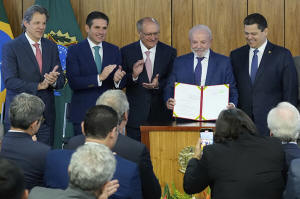Brazil's Lula announces $5.5 billion in credits for exporters hit by US
tariffs
[August 14, 2025] By
MAURICIO SAVARESE
SAO PAULO (AP) — The Brazilian government on Wednesday unveiled a plan
to support local companies affected by a 50% tariff imposed by U.S.
President Donald Trump on several of the country's exports.
Dubbed “Sovereign Brazil," the plan provides for a credit lifeline of 30
billion reais ($5.5 billion), among other measures.
Hours later, U.S. Secretary of State Marco Rubio announced new sanctions
against at least two Brazilian officials, in a move the South American
nation's health minister rebuked.
Brazil's President Luiz Inácio Lula da Silva described the plan, which
includes a bill to be sent to Congress, as a first step to help local
exporters. The leftist leader, whose poll numbers have gone up since the
tariffs against his country were announced, once again said he and Trump
have never spoken, and claimed the American president does not want to
negotiate.
Top congressional leaders attended Wednesday's ceremony at the
presidential palace in Brasilia, a first in months, in a sign of growing
political support for Lula in response to Trump.
Brazil's plan
Brazil's measures include postponing tax charges for companies affected
by U.S. tariffs, providing 5 billion reais ($930,000) in tax credits to
small- and medium-sized companies until the end of 2026, and expanding
access to insurance against cancelled orders.
The plan also incentivizes public purchases of items that could not be
exported to the U.S.
Brazil's government is also granting a one-year extension of tax credits
for companies that import items so they can produce goods for
exportation. That mechanism is called “drawback.”

“We cannot be scared, nervous and anxious when there is a crisis. A
crisis is for us to create new things,” Lula said. “In this case, what
is unpleasant is that the reasons given to impose sanctions against
Brazil do not exist.”
Trump has tied the 50% tariff on many imported Brazilian goods to the
judicial situation of his embattled ally, former President Jair
Bolsonaro, who is currently under house arrest.
Brazil’s president added that “for now” he will not use the country’s
reciprocity law to impose higher tariffs on American imports coming to
Brazil.
Ricardo Alban, the chairman of the Brazilian industry confederation,
said he hopes “this plan is behind us as quickly as possible.” He
described it as “palliative, but necessary.”
“Nothing justifies us being on the lowest of tariffs to going to the
highest of tariffs,” Alban said.
Economy or politics?
Trump has repeated a narrative pushed by Bolsonaro’s allies, which
claims the former Brazilian president’s prosecution for attempting to
overturn his 2022 election loss is part of a “deliberate breakdown in
the rule of law,” with the government engaging in “politically motivated
intimidation” and committing “human rights abuses.”
“Our American friends, every time they decide to fight with someone,
they try to create an image of a devil against the people they want to
fight with,” added Lula, who pledged to find markets to buy Brazilian
goods that will not go to the U.S.
Lula repeated on Wednesday that Brazil’s judiciary is independent. The
executive branch, which manages foreign relations, has no control over
Supreme Court justices, who in turn have stated they won’t yield to
political pressure. Bolsonaro’s trial is expected to come to the
sentencing phase sometime between September and October.
[to top of second column] |

Economy Minister Fernando Haddad, from left, Chamber of Deputies
President Hugo Motta, Brazil's Vice President Geraldo Alckmin,
Brazil's President Luiz Inacio Lula da Silva and Senate President
Davi Alcolumbte, pose for a group photo during a signing ceremony to
enact the Sovereign Brazil Plan, an aid program to support companies
affected by the 50% tariffs imposed on Brazilian products in the
United States, at the Planalto presidential palace in Brasilia,
Brazil, Wednesday, Aug. 13, 2025. (AP Photo/Eraldo Peres)
 “If what happened at the Capitol
(the U.S. riots on Jan. 6, 2021) had happened in Brazil, he (Trump)
would be on trial here too,” Lula said.
Earlier in August, Justice Alexandre de Moraes, who oversees the
case against Bolsonaro, was sanctioned under the U.S. Magnitsky Act,
which is supposed to target serious human rights offenders. De
Moraes has argued that defendants were granted full due process.
Rubio's response
Only hours after Lula's plan was announced, Rubio said the U.S.
would “restrict visa issuance to Cuban and complicit third-country
government officials and individuals responsible for Cuba’s
exploitative labor export program.”
Rubio said on X that the Brazilian government program “More
Doctors,” which was started in 2013 with thousands of Cuban doctors
spreading nationwide, was “an unconscionable diplomatic scam of
foreign ‘medical missions.’”
Brazil’s Health Minister Alexandre Padilha, who was in the same job
when the program was founded, later said the initiative “will
survive to unjustifiable attacks from no matter who.”
“This program saves lives and it is approved by those who matter
most: the Brazilian people,” Padilha said. “We will not bow to those
who are against vaccines, against research, against science and now
against two key people in my first tenure as health minister, Mozart
Sales and Alberto Kleiman (who had their U.S. visas revoked).”
Brazil’s government says the initiative currently has almost 25,000
medical professionals operating, but did not provide figures on how
many of those are Cuban.
Lawmaker Eduardo Bolsonaro, a son of the former president who is
seeking amnesty for his father and others implicated in the alleged
coup plot, praised the U.S government.
“This measure is a clear message: neither ministers, nor lower-tier
bureaucrats nor their family members are immune. Sooner or later,
everyone who contributed to support those (autocratic) regimes will
answer for what they did — and there will be no place to hide,” he
said.

Earlier, Brazil's Finance Minister Fernando Haddad said that his
country “is being sanctioned for being more democratic than its
aggressor.”
“We will face, as we have, many difficult situations and we shall
overcome," Haddad said. “This one comes from the outside, but
unfortunately it has the support of radicalized sections of Brazil's
society.”
All contents © copyright 2025 Associated Press. All rights reserved |